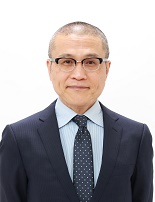 Hirohito Miyamoto
Hirohito Miyamoto
The power to “open up”
Stagnation, disparity, division – these words have come to be widely used to describe the state of our society now, and it did not start from the coronavirus crisis. However, since the outbreak, these words have become more powerful and convincing.
The coronavirus pandemic, which began in early 2020, has brought with it many problems. Among the most challenging issues for us was that so many international students were kept from entering Japan. Right now, as I write this speech, there are still postgraduate students who are unable to enter the country and continue their studies and research away from Japan.
The School of Global Japanese Studies established in 2008 and the Graduate School of Global Japanese Studies established in 2012 were inaugurated out of problem awareness that attempted to dynamically grasp the relationship between Japan and the world amid the ever-changing fluidity of the globalization era, in which people, goods, and information flow across borders.
I think there was a recognition that the power of borders as “barriers” was weakening. However, the global spread of infectious diseases such as the novel coronavirus has reminded us of the strength of the power of borders to “close.” Although the pandemic itself could not be inhibited even by the power to “close,” the movement of people was severely restricted. This has become a serious issue for the Graduate School of Global Japanese Studies, which accepts many international students and endeavors to participate in exchanges with universities and research institutes overseas.
Borders have not vanished. This has been recognized across the world since before the pandemic, but the commingling, fusion, and transformation of the economies, societies, and cultures in each country and region, which is a result of rapid globalization, does not always progress smoothly and amicably, and can lead to various conflicts and frictions, or even a backlash.
Under these circumstances, it seems the true value of Graduate School of Global Japanese Studies is being questioned. Researching Japanese language and how to teach it to non-native speakers. Researching English language and how to teach it to non-native speakers. Researching how to overcome intercultural barriers and achieve a multicultural society. Researching transnational economic activity and the roles of information media. Researching the ideal of Japanese pop culture spreading around the world. Researching various cultures and their histories that have been formed by humans, and the ideas that support them. At this moment, we are reminded that all of these activities will lead to the power for us to “open up” to outside the boundaries.
All studies aim at seeking answers to questions with the help of the accumulated knowledge of our predecessors. We need the power to open up a world where we have not yet stepped in. The kanji for “taku” (open) is expressed by a combination of hand and stone. You can imagine taking on a burdensome task like a huge stone in front of you with your own hands. The power to “open up” our horizons, and to “open up” a new world. We look forward to seeing all of you who wish to join us in realizing that strength.


